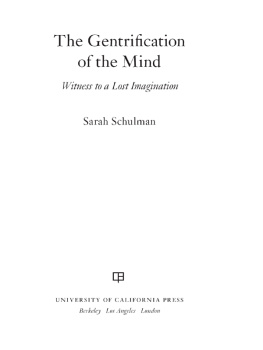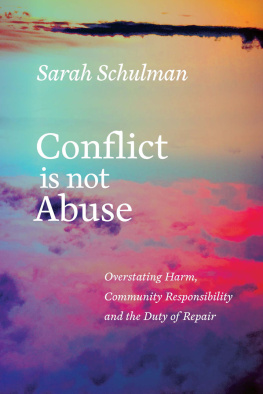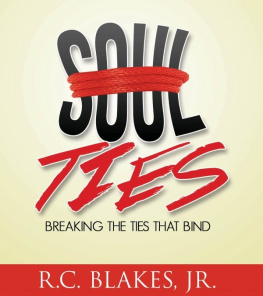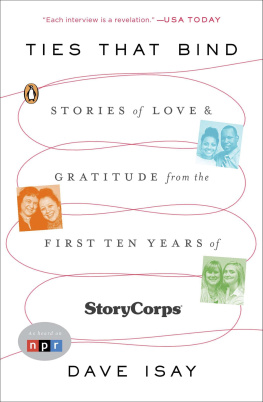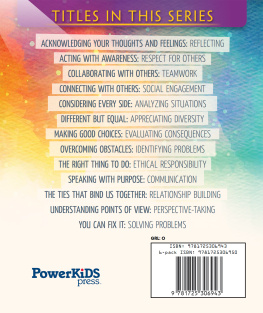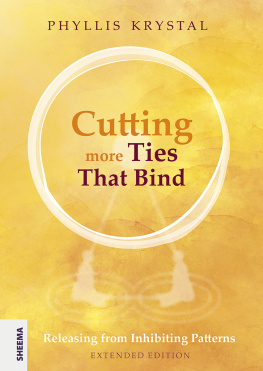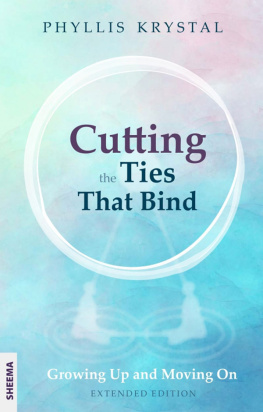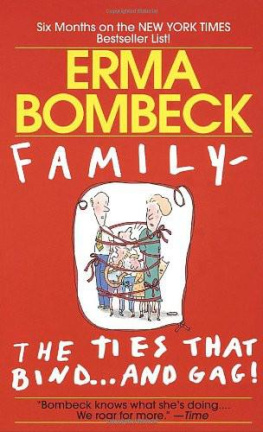Sarah Schulman - Ties That Bind: Familial Homophobia and its Consequences
Here you can read online Sarah Schulman - Ties That Bind: Familial Homophobia and its Consequences full text of the book (entire story) in english for free. Download pdf and epub, get meaning, cover and reviews about this ebook. year: 2009, publisher: New Press, The, genre: Home and family. Description of the work, (preface) as well as reviews are available. Best literature library LitArk.com created for fans of good reading and offers a wide selection of genres:
Romance novel
Science fiction
Adventure
Detective
Science
History
Home and family
Prose
Art
Politics
Computer
Non-fiction
Religion
Business
Children
Humor
Choose a favorite category and find really read worthwhile books. Enjoy immersion in the world of imagination, feel the emotions of the characters or learn something new for yourself, make an fascinating discovery.

- Book:Ties That Bind: Familial Homophobia and its Consequences
- Author:
- Publisher:New Press, The
- Genre:
- Year:2009
- Rating:3 / 5
- Favourites:Add to favourites
- Your mark:
- 60
- 1
- 2
- 3
- 4
- 5
Ties That Bind: Familial Homophobia and its Consequences: summary, description and annotation
We offer to read an annotation, description, summary or preface (depends on what the author of the book "Ties That Bind: Familial Homophobia and its Consequences" wrote himself). If you haven't found the necessary information about the book — write in the comments, we will try to find it.
Ties That Bind: Familial Homophobia and its Consequences — read online for free the complete book (whole text) full work
Below is the text of the book, divided by pages. System saving the place of the last page read, allows you to conveniently read the book "Ties That Bind: Familial Homophobia and its Consequences" online for free, without having to search again every time where you left off. Put a bookmark, and you can go to the page where you finished reading at any time.
Font size:
Interval:
Bookmark:
ALSO BY SARAH SCHULMAN
NOVELS
The Mere Future (2009)
The Child (2007)
Shimmer (1998)
Rat Bohemia (1995)
Empathy (1992)
People In Trouble (1990)
After Delores (1988)
Girls, Visions and Everything (1986)
The Sophie Horowitz Story (1984)
Collected Early Novels of Sarah Schulman (1998)
NONFICTION
Stagestruck: Theater, AIDS, and the Marketing of Gay America (1998)
My American History:
Lesbian and Gay Life During the Reagan/Bush Years (1994)
PLAYS
Enemies, A Love Story (adapted from Isaac Bashevis Singer) (2007)
Manic Flight Reaction (2005)
Carson McCullers (2002) (published by Playscripts Inc., 2006)
Familial Homophobia and
Its Consequences
Sarah Schulman

NEW YORK
LONDON
2009 by Sarah Schulman
All rights reserved.
No part of this book may be reproduced, in any form, without written permission from the publisher.
Requests for permission to reproduce selections from this book should be mailed to: Permissions Department, The New Press, 38 Greene Street, New York, NY 10013.
Published in the United States by The New Press, New York, 2009 Distributed by Perseus Distribution
CIP data available
ISBN 978-1-59558-480-9 (hc)
The New Press was established in 1990 as a not-for-profit alternative to the large, commercial publishing houses currently dominating the book publishing industry. The New Press operates in the public interest rather than for private gain, and is committed to publishing, in innovative ways, works of educational, cultural, and community value that are often deemed insufficiently profitable.
www.thenewpress.com
Composition by dix!
10 9 8 7 6 5 4 3 2 1
Dedicated to those who keep their promises.
We must understand and confront the unprecedented.
Larry Kramer
Special thanks to the Corporation of Yaddo, the MacDowell Colony and Phil Wilkie. Thanks to the many readers. Deep appreciation to Alex Juhasz, my cousins Marcia Cohen-Zakai and Alon Zakai, Alix Dobkin, Dudley Saunders and Claudia Rankine.
Despite the emphasis on gay marriage and parenthood that has overwhelmed our current discourse, how gays and lesbians are treated IN families is far more influential on the quality of individual lives and the larger social order than how we are treated AS families. Yet, as is often the case, central and uncomfortable truths take a backseat to more facile and familiar conversations. In this book, I try to articulate how and why systems of familial homophobia operate, and, more importantly, how they can be changed.
There are two experiences that most homosexuals share. One is coming out, a process of self-interrogation in opposition to social expectation that has no parallel in heterosexual life. The second common experience is that we have each, at some time in our lives, been treated shoddily by our families simply, but specifically, because of our homosexuality. This experience is, in turn, mirrored by the legal system and the dominant social structures within which gay people must live, as well as in the arts and entertainment industries, which select and control our representations. As a consequence, familial exclusion and diminishment is often extended by the behavior of gay people toward each other. It is a house of mirrors of enforcement.
Imagine if a family responded to the coming out of one of its members like this:
They discuss as a family their special responsibility to protect their daughter/sister/mother/niece/aunt/cousin from pressures and cruelties that they themselves will never face. They promise not to exploit or enjoy privileges that she is denied, and to commit their familys resources to accessing those privileges for her and other gay people. They extend this commitment to others in her community who dont have conscious, moral families. They treat those people like full human beings and support their gay family member in doing the same thing. In their larger family, friendships, workplaces, in their consumption or production of culture, in how they vote, and what laws they both support and access. They intervene when gay people are being scapegoated by directly addressing the perpetrators.
This is not an impossible scenario. Yet, today, families are more likely to tolerate homosexuals, that is, to keep them in a position of lesser value than to learn from them and be elevated by their knowledge. It is far more common to see a politician with an openly gay child actively opposing gay rights than to see him publicly praising that child for having the self-awareness and integrity to come out.
Because of the twisted nature of dominant behavior, gay people are being punished within the family structure even though we have not done anything wrong. This punishment has dramatic consequences on both our social experiences, and our most trusting, loving sexual relationships.
The specifics and dimensions of familial homophobia are broad and vast. They can range from short-sighted slights to varying degrees of exclusion to brutal attacks that distort the gay persons life to direct and indirect cruelties that literally end that persons existence. The impact of this will vary, of course, based on what other kinds of support systems the victim has been able to accrue, how committed the family is to enforcing the homophobia, and what kind of interventions are performed by third parties. If the familys prejudices are flexible, if the victim has consistent and reliable active support from others, and if other individuals in the family or community actively intervene to denounce, and therefore mitigate the impact of the cruelty, familial homophobia can be an unnecessary but overcomeable obstacle.
Without compassionate intervention, however, familial homophobia can become an overwhelmingly wrenching determinate on the gay persons life. Worse, it can be the model for the ways that gay people treat each other. History shows that recipients of undeserved crueltyscapegoatsare dependent on the intervention of third parties to support their own acts of resistance. The weak need help. This often starts with a few individuals putting themselves between perpetrators and victims, and results ultimately in new kinds of social standards and sometimes legislation.
Strangely, the issues of this book are both obvious and denied. After all, it is being written in a moment when most people will tell you that things are getting better without being able to define, beyond banal clich, what that actually means. The AIDS crisis forced America to start the process of acknowledging that gay people exist. Thus, even though there are many institutions today that still pretend that we do not exist, there are other institutions that acknowledge, in some form, that we do exist. This is a significant change, but not progress. In many states, cities, and counties, gay people can be fired from their jobs, kicked out of their homes, refused service in restaurants or hotels, denied membership in organizations and communities, and experience other victimizing humiliations. In five states (as of May 2009), gay and lesbian couples can be legally married. Its a bizarre set of daily contradictions that gay, lesbian, bisexual, and transgender people must balance and internalize. Some television shows have central characters who are homosexual; other television shows convey entire worlds in which homosexuality is never acknowledged. You never know what youre going to find around each corner.
Font size:
Interval:
Bookmark:
Similar books «Ties That Bind: Familial Homophobia and its Consequences»
Look at similar books to Ties That Bind: Familial Homophobia and its Consequences. We have selected literature similar in name and meaning in the hope of providing readers with more options to find new, interesting, not yet read works.
Discussion, reviews of the book Ties That Bind: Familial Homophobia and its Consequences and just readers' own opinions. Leave your comments, write what you think about the work, its meaning or the main characters. Specify what exactly you liked and what you didn't like, and why you think so.

